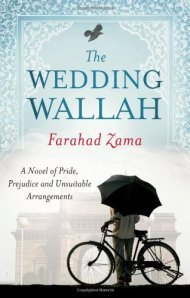“The Wedding Wallah” by Farahad Zama
 The Wedding Wallah
The Wedding Wallah by Farahad Zama is the third book of a series (starting with The Marriage Bureau for Rich People
) set in my hometown, Vizag. No one ever writes books set in Vizag, so this fact alone almost guarantees that I’d love these books. However, they’re also actually pretty well-written, have great characters, and more importantly, they have a lot of heart. They remind me a lot of the The No. 1 Ladies’ Detective Agency
books by Alexander McCall Smith – slow and somewhat sleepy, but not boring.
Anyway, enough about the series. The Wedding Wallah sees all of our favourite characters return: Mr. and Mrs. Ali’s marriage bureau is still doing brisk business, Rehman has still not been cured of his idealism, Pari is still determined to be an independent young woman and Aruna is fully settled into her marriage, although she still helps out at the marriage bureau. We are introduced to a new character, Dilawar, who is from a wealthy and aristocratic family, but hasn’t found a bride yet. His family, for whatever reason, believes that the relatively poor Pari would be a good bride for him, despite her widowed status and adopted son. Meanwhile the Naxalites (terrorists with communist ideologies) are growing increasingly active in the villages surrounding Vizag. Intertwined with these are a few stories from the marriage bureau side of things. And of course, people are falling in love all over the place.
The book is as charming as previous installments, and it left me wanting more, immediately. I’m not sure how much this has to do with my excitement whenever a place I know is mentioned (which happens a lot.) I was especially excited when the bookstore that I bought the book from was mentioned as a place that one of the characters bought books from!
I thought the Naxalite plot was a little too dramatic in comparison with the rest of the book; it was a little jarring. However, it still made sense. I think that these book really do capture Vizag very well. The only flaw that I can find is that the people sometimes seem too idealistic. This book is also slightly more racy than the other books, which was fine, but a tiny bit unexpected. I was also glad that the book addressed a few modern issues – the Naxalites are portrayed fairly, showing both the bad and the good, and I thought that the inclusion of gay rights in India was also a nice touch and a nice nod to the recent decriminalisation of homosexuality.
I’m just frustrated that I don’t live in the UK, since that’s the only way I can pre-order the next book on Amazon!

So, there is another book coming? Was it Rehman who they referred to as the dead soldier at the end of the book, and Pari who married the school teacher?